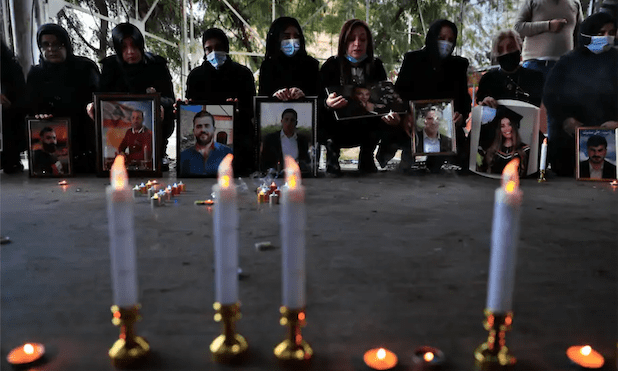Relatives of victims of the Aug. 4 Beirut port explosion hold portraits of their loved ones killed during the explosion, during a vigil at the seaport main entrance, as they mark four months since the blast that killed more than 200 people and injured thousands Friday, Dec. 4, 2020. An investigation has yet to provide answers or hold any senior official responsible and the victims are demanding answers and justice for their loved ones.
BEIRUT — Lebanon’s Hezbollah said Friday it is suing a former Christian lawmaker and a website affiliated with a Christian political party for defamation, after they accused the Shiite militant group of being responsible for the devastating explosion at Beirut’s port this summer.
Hezbollah’s legal representative Ibrahim Mussawi said the accusations, leveled by Fares Souaid and the website of the right-wing Lebanese Forces party, were misleading.
Mussawi, also a Hezbollah lawmaker, told a press conference outside the courts house that blaming the group threatens to disrupt social peace in Lebanon, at a time when the United States is exerting maximum pressure on his party and its allies. Washington considers Hezbollah a terrorist group and has been escalating sanctions against it and its political allies in Lebanon.
The massive Aug. 4 blast was caused by nearly 3,000 tons of ammonium nitrates, a fertilizer that was improperly stored at a port warehouse for six years. The blast killed more than 200 people and wounded over 6,000, and extensively damaged several neighborhoods in Beirut.
Some of Hezbollah’s political opponents and civilians have since blamed the group for storing the explosive chemicals at the port. Hezbollah is the only group that kept its weapons after Lebanon’s civil war ended in 1990 and is believed to have ammunition stored in some parts of the country.
The claim was dismissed by Hezbollah’s leader. No evidence has emerged to link the group to the explosive chemicals.
But four months after the explosion, an investigation has yet to provide an explanation for what happened — or hold any senior official responsible. Families of the victims have asked for an international probe, in a country where violent attacks and assassinations are rarely brought to justice.
Lebanon’s port authority, security agencies and political leadership were all aware of the stored explosive chemicals at the port, documents have shown. The port is one of the country’s facilities where rampant corruption has been reported.
On Friday, families of victims of the blast rallied at the port to commemorate the four months since the explosion. Holding pictures of their loved ones, the families demanded justice, calling for senior officials to be interrogated and brought before prosecutors.
A woman reading a statement from the families called the explosion a “crime against humanity” and said no official in Lebanon should have immunity from prosecution. She also said the families are demanding that the probe be handled by regular prosecutors, in criticism of the judicial council currently charged with dealing with the investigation.
Rights groups have called for an international investigation, citing political meddling in the Lebanese judiciary.
Souaid, the former lawmaker, tweeted in September that Hezbollah weapons stored in the port were the cause of the explosion.
“When the US administration’s main concern and daily bread is to go after Hezbollah and attempt to pressure governments to put it on the terrorism list … you’d gather that there are tools inside and outside that help with that,” Mussawi said.
Souaid said he had no comment about details of the case against him, adding that lawyers would review it on Monday. There was no immediate comment from the Lebanese Forces party.
Mussawi said he also plans to press charges against Bahaa Hariri, the son of late Prime Minister Rafik Hariri, who is living in exile. He is also the estranged brother of Prime-Minister designate Saad Hariri.

